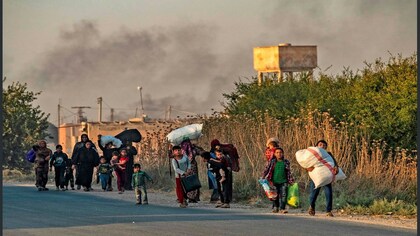Iran: Syria’s Big Brother
15:29 - 9 November 2011

Iran’s rulers are as brutal as Syria’s, and a far bigger threat to us.
When it comes to harsh words and denunciations from the West, Iran and Syria run neck and neck. Yet when it comes to taking meaningful action, the international community regrettably hesitates to do for Iran what it has done for Iran’s junior partner.
In recent months, EU member states and the Obama administration have not only been vocal in denouncing Syria’s brutal treatment of protesters, but have also backed up their words with serious penalties. Specifically, the European Union sanctioned Syria’s Central Bank on October 13, after deciding on September 2 to ban EU member states from importing Syrian oil. The embargo was particularly consequential, given that oil has been a major source of revenue for the Syrian regime, and 95 percent of its customers were EU members.
What is puzzling is that both the Obama administration and the EU have been disinclined to impose the same penalties on Iran, even after the October 11 revelation of the regime’s plot to commit terrorist attacks on U.S. soil. While punishing Syria is wholly justifiable, the same can’t be said of EU member states’ silence toward Syria’s big brother (exemplified by their resistance to banning oil imports from Iran), or the Obama administration’s reluctance to sanction Iran’s Central Bank. The truth is that Iran’s rulers are by all accounts just as brutal as Syria’s, and just as deserving of similar sanctions.
When it comes to human rights, Syria and Iran are kindred spirits. The Iranian regime tops every human-rights organization’s list of abusers, and it is currently on an execution binge that has claimed more than 200 lives so far this year. Iran continues to track, spy on, and arrest political protesters and dissidents, and the U.N.’s special rapporteur on human rights in Iran recently released a report claiming that authorities conducted 446 secret executions in 2010 and 2011. The Iranian regime is notorious for prosecuting citizens for “crimes” such as being homosexual, Christian, or a journalist, and has made a habit of publicly hanging people from construction cranes.
Worst of all, Iran is an even bigger threat to the U.S. and the world than Syria. The regime is the world’s leading state sponsor of terrorism, is allied with al-Qaeda, and is responsible for the deaths of American and NATO troops in Iraq and Afghanistan. As mentioned, Iran has now been revealed to have plotted terrorist attacks on U.S. soil, and of course it continues to pursue nuclear weapons in defiance of international law.
It is time for the Obama administration, the EU, and the rest of the free world to confront this grave threat before it is too late. Iran certainly merits the same sanctions already imposed on Syria, and now is the perfect time for them. Iran’s fragile economy would incur severe harm from an oil ban by the EU states, on which its trade revenues now depend. Even President Ahmadinejad has admitted that current sanctions are working. Ratcheting them up now would put even more pressure on the regime.
Specifically, sanctions against Iran’s Central Bank — which have the support of 92 U.S. senators but have reportedly been tabled by the Obama administration — would sever Iran from the international banking system and thus hinder its ability to trade. The administration needs to take this action, and must also make clear that any further acts of war by Iran will be met with a swift military response.
Lawmakers can also take immediate action to ensure the enforcement of existing sanctions. First, while U.S. law rightly forbids American companies to do business with Iran, some, such as Honeywell, sell sensitive energy products there through foreign subsidiaries. This foreign-subsidiary loophole should be closed immediately, as Rep. Ileana Ros-Lehtinen (R., Fla.) and other members of Congress have recently proposed, and the offending companies should be sanctioned by the U.S. government for their irresponsible circumvention of long-standing bans on trade with Iran.
Second, the Obama administration must enforce existing provisions in Iranian energy sanctions, such as the certification requirement which bans companies that do business in Iran’s oil sector from receiving U.S.-government contracts. A recent GAO report revealed that a number of companies, including South Korea’s Daelim, receive contracts from the Pentagon while also doing business in Iran. This is outrageous. The Obama administration must immediately sanction such companies and affirm that U.S. tax dollars will not go to businesses that are in bed with a regime that is supporting terrorists and killing American troops.
As jarring as it was to learn of the recent Iran-sponsored terrorist plot, significant good can result if it serves as the catalyst for the Obama administration and the international community to impose the sorts of sanctions on Iran that have already deservedly been imposed on Syria. A template for imposing effective measures in response to a brutal regime’s intransigence has been established with Syria. It should now be applied to Iran.
By: Mark D. Wallace, NAATIONAL REVIEW ONLIANE
When it comes to harsh words and denunciations from the West, Iran and Syria run neck and neck. Yet when it comes to taking meaningful action, the international community regrettably hesitates to do for Iran what it has done for Iran’s junior partner.
In recent months, EU member states and the Obama administration have not only been vocal in denouncing Syria’s brutal treatment of protesters, but have also backed up their words with serious penalties. Specifically, the European Union sanctioned Syria’s Central Bank on October 13, after deciding on September 2 to ban EU member states from importing Syrian oil. The embargo was particularly consequential, given that oil has been a major source of revenue for the Syrian regime, and 95 percent of its customers were EU members.
What is puzzling is that both the Obama administration and the EU have been disinclined to impose the same penalties on Iran, even after the October 11 revelation of the regime’s plot to commit terrorist attacks on U.S. soil. While punishing Syria is wholly justifiable, the same can’t be said of EU member states’ silence toward Syria’s big brother (exemplified by their resistance to banning oil imports from Iran), or the Obama administration’s reluctance to sanction Iran’s Central Bank. The truth is that Iran’s rulers are by all accounts just as brutal as Syria’s, and just as deserving of similar sanctions.
When it comes to human rights, Syria and Iran are kindred spirits. The Iranian regime tops every human-rights organization’s list of abusers, and it is currently on an execution binge that has claimed more than 200 lives so far this year. Iran continues to track, spy on, and arrest political protesters and dissidents, and the U.N.’s special rapporteur on human rights in Iran recently released a report claiming that authorities conducted 446 secret executions in 2010 and 2011. The Iranian regime is notorious for prosecuting citizens for “crimes” such as being homosexual, Christian, or a journalist, and has made a habit of publicly hanging people from construction cranes.
Worst of all, Iran is an even bigger threat to the U.S. and the world than Syria. The regime is the world’s leading state sponsor of terrorism, is allied with al-Qaeda, and is responsible for the deaths of American and NATO troops in Iraq and Afghanistan. As mentioned, Iran has now been revealed to have plotted terrorist attacks on U.S. soil, and of course it continues to pursue nuclear weapons in defiance of international law.
It is time for the Obama administration, the EU, and the rest of the free world to confront this grave threat before it is too late. Iran certainly merits the same sanctions already imposed on Syria, and now is the perfect time for them. Iran’s fragile economy would incur severe harm from an oil ban by the EU states, on which its trade revenues now depend. Even President Ahmadinejad has admitted that current sanctions are working. Ratcheting them up now would put even more pressure on the regime.
Specifically, sanctions against Iran’s Central Bank — which have the support of 92 U.S. senators but have reportedly been tabled by the Obama administration — would sever Iran from the international banking system and thus hinder its ability to trade. The administration needs to take this action, and must also make clear that any further acts of war by Iran will be met with a swift military response.
Lawmakers can also take immediate action to ensure the enforcement of existing sanctions. First, while U.S. law rightly forbids American companies to do business with Iran, some, such as Honeywell, sell sensitive energy products there through foreign subsidiaries. This foreign-subsidiary loophole should be closed immediately, as Rep. Ileana Ros-Lehtinen (R., Fla.) and other members of Congress have recently proposed, and the offending companies should be sanctioned by the U.S. government for their irresponsible circumvention of long-standing bans on trade with Iran.
Second, the Obama administration must enforce existing provisions in Iranian energy sanctions, such as the certification requirement which bans companies that do business in Iran’s oil sector from receiving U.S.-government contracts. A recent GAO report revealed that a number of companies, including South Korea’s Daelim, receive contracts from the Pentagon while also doing business in Iran. This is outrageous. The Obama administration must immediately sanction such companies and affirm that U.S. tax dollars will not go to businesses that are in bed with a regime that is supporting terrorists and killing American troops.
As jarring as it was to learn of the recent Iran-sponsored terrorist plot, significant good can result if it serves as the catalyst for the Obama administration and the international community to impose the sorts of sanctions on Iran that have already deservedly been imposed on Syria. A template for imposing effective measures in response to a brutal regime’s intransigence has been established with Syria. It should now be applied to Iran.
By: Mark D. Wallace, NAATIONAL REVIEW ONLIANE



